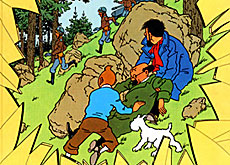On the trail of Tintin in Switzerland

The daring boy reporter Tintin and his faithful dog Snowy are known to millions round the world through the comic books of the Belgian writer-illustrator Hergé.
Since they first began appearing in the 1930s the books have been translated into more than 60 languages, including recently Swiss German and Romansh.
Hergé – real name Georges Rémi – would have approved. The artist, who died 20 years ago, had a lasting affection for Switzerland.
He first discovered the country’s attractions during a visit with the Boy Scouts in 1922. He became a regular visitor, in later years finding in Switzerland a place to retreat to when the pressures became too great.
“He was very discreet and was happy that in Switzerland no one recognised him,” Laurent Missbauer, a Swiss “Tintinologist” told swissinfo.
Hergé spent most of his time in Switzerland in the French- and Italian-speaking parts, where he enjoyed walking in the mountains.
The Geneva connection
During a visit to the Lake Geneva area, Missbauer says Hergé struck up a close friendship with the Fornara family of Gland.
Perhaps as a way of thanking them and his many fans in Switzerland, Hergé set much of the action of his 1956 book, “The Calculus Affair” in and around Geneva.
Considered one of his finest works, the book centres on the kidnap of Tintin’s friend Professor Calculus and the fight by Cold War rivals for possession of one of his scientific inventions.
The Hotel Cornavin in Geneva’s city centre is where Tintin, and fellow adventurer Captain Haddock start their search for Calculus after the professor mysteriously disappears.
The hotel has since become a place of pilgrimage for Tintinophiles retracing the steps of Hergé who stayed in the hotel on at least one occasion.
Fans are attracted to the hotel by the life-size statue of Tintin, which stands next to the revolving doors. But once inside it’s room 122 they want to see – the room where Hergé had Calculus stay.
They are bound to be disappointed. While the outside of the hotel is little changed since the 1950s, room 122 has been recently redecorated and there is nothing on the blank walls to indicate a connection with the Hergé books.
Nevertheless, some diehard fans are determined to leave with a souvenir of their time at the hotel.
“The key holder for that room sometimes goes missing,” hotel director Marc Fassbind told swissinfo. “People staying in that room seem to just forget to return the key.”
Professor Calculus
While Switzerland’s scenery made an impact on Hergé, the country also gave him the inspiration for at least one of his characters.
Hergé himself admitted that the absent-minded, sometimes comical Professor Calculus was based on the Swiss scientist Auguste Piccard, famous for his stratospheric and underwater exploration.
Piccard was for a time professor in Brussels, where Hergé sometimes passed him in the street.
Piccard’s grandson Bertrand, himself famous for making the first round-the-world flight in a balloon, says the connection is a source of pride for the Piccard family.
“When I heard that Professor Calculus was inspired by my grandfather I was happy. I would say my grandfather entered history through his stratospherical flights, and entered the legions thanks to Hergé,” Piccard told swissinfo.
“My grandfather was always thinking about a lot of things, a lot of inventions, calculations… so sometimes he really didn’t seem to belong to our world, and in that sense he’s quite similar to Calculus.”
But, as Laurent Missbauer points out, despite August Piccard’s amazing achievements, Calculus was just one step ahead.
“As Hergé put Tintin on the moon before Armstrong, so Professor Calculus started his underwater exploration before Piccard.”
swissinfo, Morven McLean
Georges Rémi is born in Belgium on May 22 1907, and dies on March 3 1983.
In 1922 he pays his first visit to Switzerland with the Boy Scouts.
From 1924 he signs his works Hergé – derived from the French pronunciation of his initials reversed.
The first Tintin book is written in 1929.
Twenty-four albums follow, including the 1956 book “The Calculus Affair”.
The books are translated into more than 60 languages including Swiss German dialects and Romansh.

In compliance with the JTI standards
More: SWI swissinfo.ch certified by the Journalism Trust Initiative









You can find an overview of ongoing debates with our journalists here . Please join us!
If you want to start a conversation about a topic raised in this article or want to report factual errors, email us at english@swissinfo.ch.